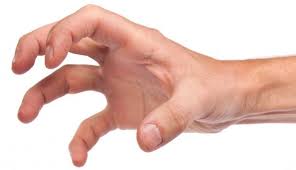记忆方法
将“grab”与“grasp”(抓紧)的概念联系起来,想象自己用手迅速地“抓”住某物,这样就能快速记忆“grab”这个词,其意义为“抓住”或“夺取”。
以上内容由AI生成, 仅供参考和借鉴
中文词源
grab 抓住
来自PIE*ghrebh, 抓住,够到,词源同grasp.来自PIE*ger的扩大形式,围,集中,词源同cram, aggregate.
英语词源
- grab
-
grab: [16] Grab is a Germanic word. It was probably borrowed from Middle Dutch or Middle Low German grabben. These were descendants of a prehistoric Germanic *grab-, which could well have been related to the *graip-, *grip- which produced grip, gripe, and grope.
=> grip, gripe, grope - grab (v.)
- "seize forcibly or roughly," 1580s, from Middle Dutch or Middle Low German grabben "to grab," from Proto-Germanic *grab-, *grap- (cognates: Old English græppian "to seize," Old Saxon garva, Old High German garba "sheaf," literally "that which is gathered up together"), from PIE *ghrebh- (1) "to seize, reach" (cognates: Sanskrit grbhnati "seizes," Old Persian grab- "seize" as possession or prisoner, Old Church Slavonic grabiti "to seize, rob," Lithuanian grebiu "to rake"). Sense of "to get by unscrupulous methods" was reinforced by grab game, a kind of swindle, attested from 1846. Related: Grabbed; grabbing.
- grab (n.)
- 1777, "thing grabbed;" 1824, "act of grabbing, a sudden grasp or seizing" from grab (v.). Up for grabs attested from 1945 in jive talk.
权威例句
- 1. He made a grab for her but she sidestepped him.
- 他想要抓住她,但她侧步闪开了。
- 2. He edged closer to the telephone, ready to grab it.
- 他慢慢挪向电话机,准备抓起听筒。
- 3. I grab George'sarm and dig my nails into his flesh.
- 我抓住乔治的胳膊,指甲抠进了他的肉里。
- 4. He was clumsily trying to grab at Alfred's arms.
- 他笨手笨脚地想抓住艾尔弗雷德的手臂。
- 5. Those who seek to grab power through violence deserve punishment.
- 企图通过暴力夺权的人理应受到惩罚.

